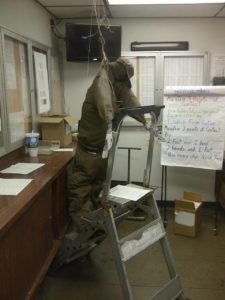
Donald Ragland, 63, left, and William Barber, 54. Photo by The Lexington Herald-Leader
Eight Black employees won a $5.3 million lawsuit Thursday over claims of discrimination and inhabitable work conditions at a UPS in Lexington, Kentucky.
The employees said they have dealt with the ramifications of the initial incident for nearly four years.
According to the Associated Press, a dummy dressed in a UPS uniform hung from the ceiling from August 9-13 in 2012. The plaintiffs said a manager put the dummy up for a safety instruction to show the “three points of contact” when using a ladder.

The dummy is tied around the neck appearing as a lynched man.
The lawsuit states that the dummy’s hands and one foot were tied to a ladder. Twine was tied around its neck and to the ceiling — giving the dummy the appearance of a lynched man.
The twine around the neck was said to be used to “prevent the dummy from falling forward.”
William Barber, a current UPS tractor-trailer driver and plaintiff, said:
“The verdict of the jury maybe will change things at UPS, because they really need change … We hope UPS sees this and addresses the situation.”
Barber said he saw the effigy when he came to work at 3 a.m in August of 2012.
“It was a relief to know that the jury, our peers, sat and listened and found in our favor,” said Donald Ragland, 64, another plaintiff who is now retired.
UPS spokesperson Susan Rosenberg told the AP that the Atlanta-based corporation is very disappointed with the decision. They are discussing an appeal of the decision.
“UPS has strict policies against harassment and discrimination,” Rosenberg said. “We reinforce that. There’s no retaliation if employees raise concerns.”
The Lexington Harald-Leader reports that Barber will be awarded $1.5 million for emotional and mental distress. The other plaintiffs awards are:
- $1 million to David Young
- $810,000 to Glenn Jackson
- $800,000 to John Hughes
- $500,000 to Ragland
- $500,000 to Jeffrey Goree
- $100,000 to Curtis Weathers
- $100,000 to Lamont Brown
The plaintiffs also claim they were called a variety of racial slurs in the workplace, including “jungle bunny,” “porch monkey” and the n-word.
After taking their complaints to human resources they said were reprimanded and their grievances were not listened to. They said they had “extended ride-alongs” on their routes “as a subtle means to intimidate and punish the plaintiffs for raising these issues.”


